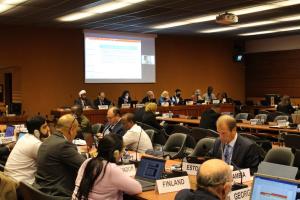While freshwater and marine specialists have largely worked in silos, nature has always worked as one: the land, freshwater, and ocean ecosystems are closely interlinked and interdependent. So must be their management.
Bringing together the freshwater and ocean communities, the Global Workshop on Source-to-sea Management gathered more than 300 key stakeholders in Geneva and online from 14 to 16 December 2022 with the aim to strengthen cooperation, identify synergies between their activities and share good practices in policy making.
Every year, tens of millions of tons of plastic waste as well as toxic metals, oil, and persistent organic pollutants enter the ocean from land sources passing through rivers and waterways. Considering that 6 of the 10 rivers contributing 90 percent of the plastic waste to oceans are transboundary, the role of the Water Convention appears to be critical. “Turning the tide on marine pollution certainly requires breaking silos and coordinating action among sectors and countries. Cooperation over shared waters forms part of the much-needed solution. The Water Convention is a powerful tool to advance cooperation", stressed Ms. Olga Algayerova, UNECE Executive Secretary during the workshop.
The workshop’s discussions covered policy, governance and finance aspects of source-to-sea management but also identified practical steps forward for its implementation:
-
Transboundary and intersectoral cooperation must be strengthened.
A holistic approach is necessary to overcome institutional and legislative silos and to coordinate across sectors and national borders which is a corner stone of transboundary water management and the Water Convention.
-
More awareness and capacity-building are needed.
There is the need to communicate in a common language and inform about the benefits of source-to-sea approach.
-
More incentives are needed to integrate source-to-sea issues in investments.
The role of the private sector and blended finance is crucial as well as the need to consider transboundary waters as a public good.
-
There is momentum and urgency to accelerate source-to-sea action.
The 2023 UN Water Conference (22-24 March 2022), the UN Ocean Conference, the SDG 2023 Summit, COP28, are all outstanding opportunities to raise political ambition and commitment to the water agenda, including source-to-sea approaches, and bring global freshwater and ocean communities closer to each other.
The Global Workshop on Source to Sea Management was organized under the auspices of the Water Convention serviced by UNECE, in partnership with Estonia, Slovenia, the Global Water Partnership (GWP), the Stockholm International Water Institute (SIWI), the Global Environment Facility (GEF), the GEF IW: LEARN platform, The Intergovernmental Oceanographic Commission (IOC) of UNESCO and the UNEP Mediterranean Action Plan.


